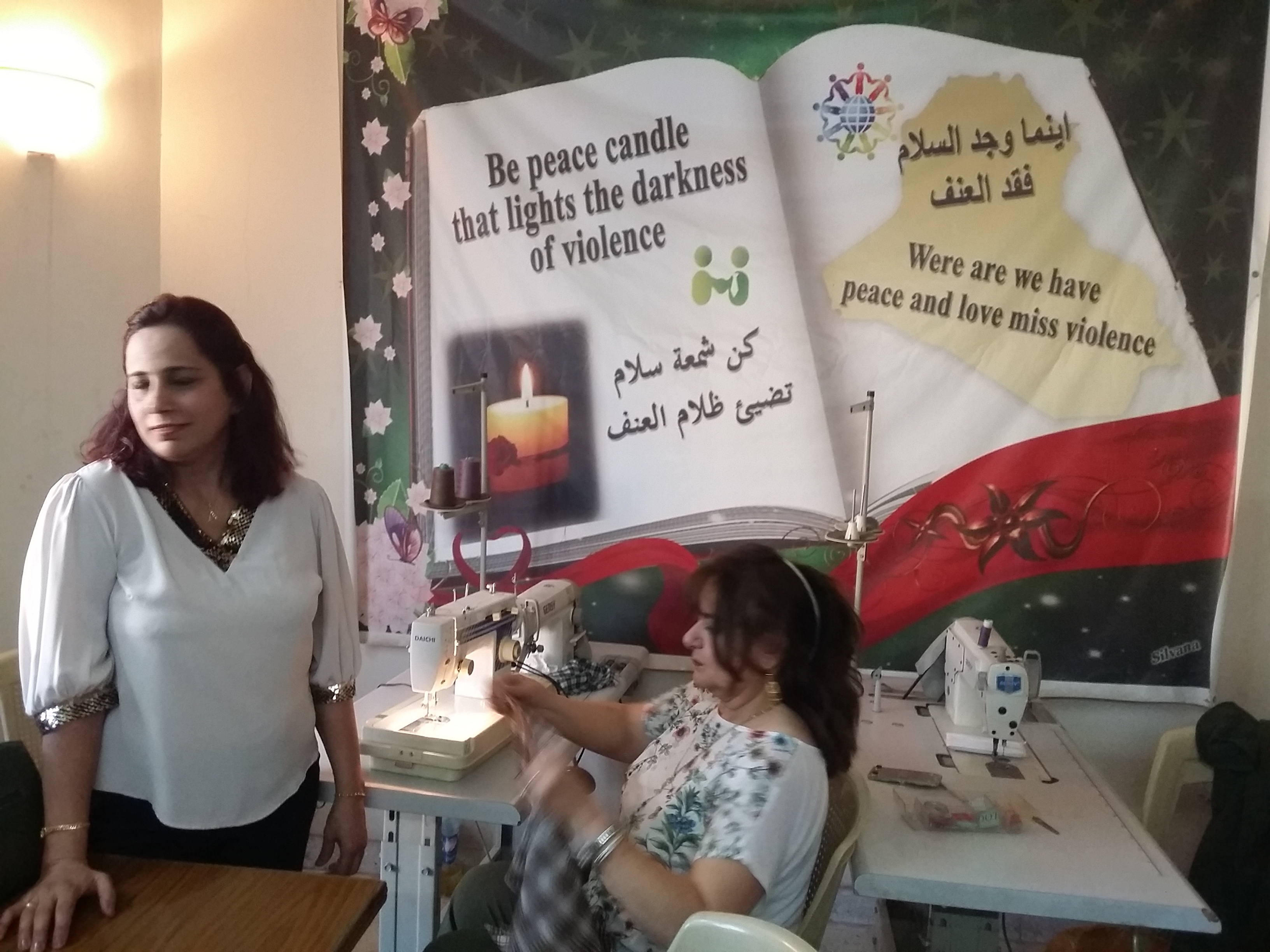POST-ISIS
They are sowing “seeds of resilience and peaceful coexistence”; they assist the poor, promote equal rights, foster citizens’ participation in civil society: they are the members of the “Volunteers and Peace Building Programme” promoted by Caritas Iraq with the support of Caritas Italy and Missio Germany, to help Iraq recover from the war that broke out in 2003, followed by ISIS occupation.

“Be a candle of peace that sheds light on the darkness of violence”, reads a poster covering a whole wall in the headquarters of the “Volunteers and Peace Building Programme”, located in the centre of Baghdad, not far from the Latin Archbishopric . The young volunteers of the programme launched in 2005 by Caritas Iraq with the support of Caritas Italy and Missio Germany, meet here every day. There are over 200 of them, also present in the north of the Country.
Aida Emanuel, the person in charge, receives a delegation from Caritas Internationalis and other European Caritas (Italy, Belgium, Spain and Germany), CRS (Catholic Relief Services, USA), presently in Baghdad for a meeting organized by Caritas Iraq: “those words – she says indicating the poster – sum up the meaning of our commitment and our work.”
“Our goal is to plant the seeds of citizenship
and of peaceful coexistence, help the poor, promote equal rights, foster citizens’ participation in civil society.” These are the components of a recipe designed to help Iraq recover from the crisis caused by the 2003 war (Iraqi freedom) sparked off by the United States to defeat Saddam Hussein’s regime, and subsequently as a result of the sectarian clashes between Shiites and Sunnis culminating, in 2014, in the invasion of ISIS.
“Lack of jobs for young people, poverty, political instability, corruption, sectarianism, insecurity, increasing prevalence of psychological and social diseases, especially among women, as well as social and family fragmentation” are the challenges Iraq is facing today. “The Islamic State – the coordinator said – has divided our people even more, having lost many of their spiritual, moral and social values. We feel a strong need to rebuild our community and to grow in solidarity”.
Only the next generation will be able achieve this. The “Volunteers and Peace Building Programme” aims to train young people of all faiths and ethnic groups and involve their peers along the path of resilience and citizenship. The fact that many of our young volunteers are, or have been, displaced by war is an added value to their work.
They are sentinels who watch over their fellow citizens and their needs.”
Remaining in Iraq. In the past few days the volunteers have been leafleting to raise awareness on the right to health. The red shirts bearing a meaningful logo – a white heart that contains a smaller one – attract the attention of passers-by.
 Some people draw closer, exchange a few words and take the leaflet, others walk by without taking notice. “For us, pursuing these programmes also means helping our people remain in Iraq,” adds Aida. We want to rekindle the love for our country in people’ hearts.” It’s the best answer to widespread sectarianism. Other young workers take turns in the Caritas headquarters coordinating tailoring, beautician courses and technical drawing workshops for the most vulnerable women and girls. Fadi, responsible for the volunteers, points out: “in this way we try to connect with all sectors of Iraqi society to build bridges of dialogue and restore confidence between different ethnic groups. Volunteering sows seeds of commitment, citizenship and love for our country.
Some people draw closer, exchange a few words and take the leaflet, others walk by without taking notice. “For us, pursuing these programmes also means helping our people remain in Iraq,” adds Aida. We want to rekindle the love for our country in people’ hearts.” It’s the best answer to widespread sectarianism. Other young workers take turns in the Caritas headquarters coordinating tailoring, beautician courses and technical drawing workshops for the most vulnerable women and girls. Fadi, responsible for the volunteers, points out: “in this way we try to connect with all sectors of Iraqi society to build bridges of dialogue and restore confidence between different ethnic groups. Volunteering sows seeds of commitment, citizenship and love for our country.
“Coexistence moves Iraq forward”.
The numbers seem to prove him right as some 14,000 people in Iraq benefit from the “Peace Building” programme. And the numbers are growing steadily. “We have two teams of volunteers in Zakho, one in Ankawa, in northern Iraq (Iraqi Kurdistan). Others are being created.” “We initiated psychological counselling for people traumatised by war, we adopted poor families, delivered food and medicine packages, and we organised meetings between people belonging to different faiths.”
The Zaiouna camp. The volunteers of the “Peace Building programme” dedicate special attention to the displaced people of the Zaiouna camp, home to 75 Christian families (over 400 people) from Mosul. They have been here for over two years, waiting to return to their homes, but – until now – to no avail. There are no tents but container homes or shelters and a large tensile structure where dozens of children gather to play and follow the catechesis.
“The Christian presence here has dropped significantly”, Aida said. “The lack of stability, security and jobs has driven many of our families to flee and try their luck in Canada, Australia and the USA. Thanks to the help of Caritas Iraq and its partners, the camp’s residents attend psychological counselling courses.
The war and the Islamic State have caused serious traumas. The best medicine for children is playing and going to school, which is what we try to offer. Helping Christian families to remain also means preserving the Christian presence in the country. Christians are keen to be active participants in the reconstruction of Iraq.”
The tensile structure is now full of children. “They are many small candles of peace – Fadi said – shedding light in the darkness of a life of violence and uncertain future”. The volunteers prepared games and gifts for an afternoon of joy – while looking forward to an even greater celebration next year, “when Pope Francis will visit Iraq. Embracing him is our dream.”